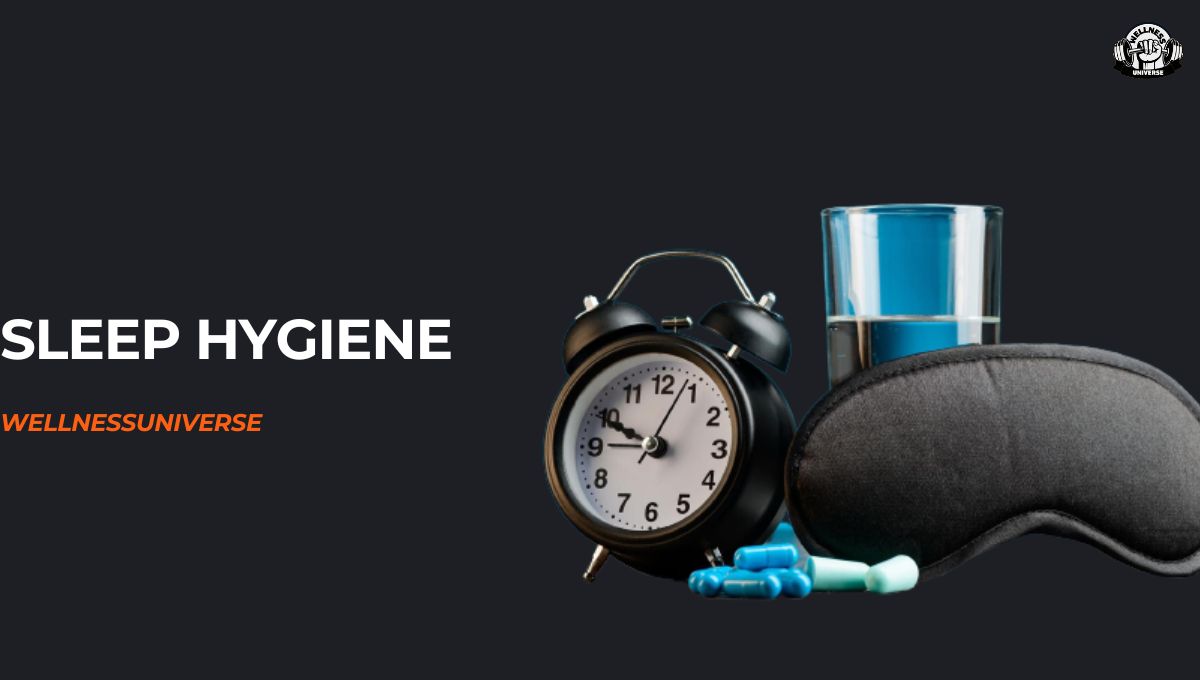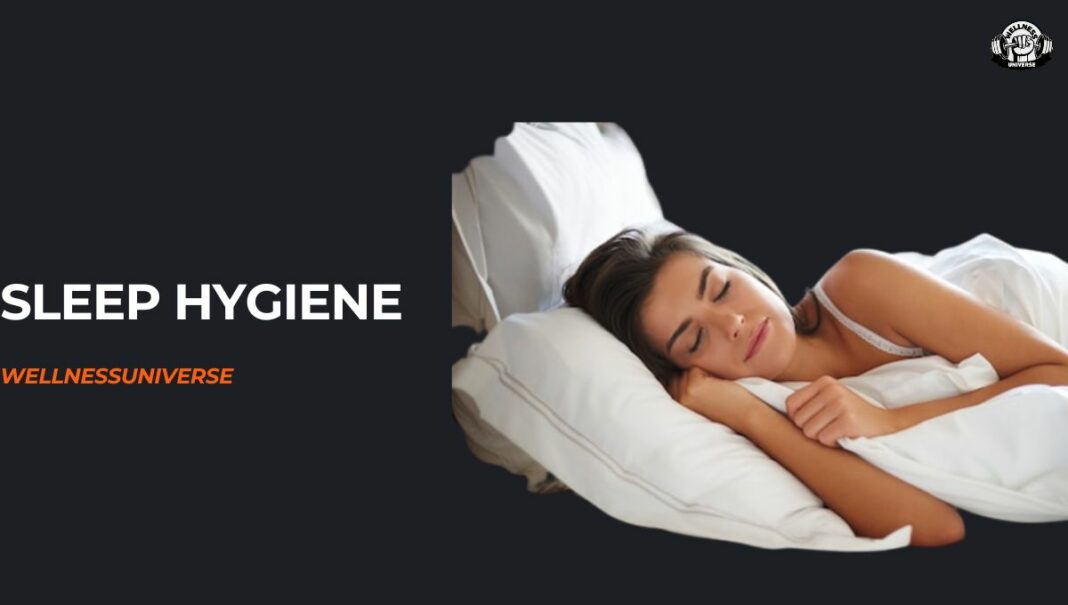Welcome, dear readers, to the fascinating realm of sleep hygiene—a topic that holds the key to unlocking the wonders of restful nights and energized days. Sleep hygiene, often overlooked yet vital, refers to the practices and habits that influence the quality of our sleep. In this comprehensive guide, we embark on a journey to explore the profound impact of sleep hygiene on our well-being and the transformative benefits it brings to our lives.
Sleep is not merely a passive state; it is a vital component of a healthy lifestyle. By embracing the principles of sleep hygiene, you open the door to a world of rejuvenation and vitality. Prepare to delve into the secrets of a good night’s sleep and discover the power it holds to enhance every aspect of your life. From improved cognitive function to heightened emotional well-being, sleep hygiene will be your ally in the quest for a more fulfilling and energized existence.
As the saying goes, “A sound mind resides in a sound body.” Sleep hygiene plays a pivotal role in fostering physical, mental, and emotional well-being. The quality and quantity of our sleep directly influence our ability to perform daily tasks, cope with stress, and maintain optimal health. Lack of sleep or poor sleep can lead to an array of health issues, including weakened immunity, impaired cognitive function, and mood disturbances.
Embracing good sleep hygiene is not just a short-term solution; it is a long-term investment in your overall health. By prioritizing your sleep and adopting sleep-promoting habits, you pave the way for enhanced vitality, resilience, and a brighter outlook on life. We invite you to explore the science behind this transformative phenomenon and the ways in which you can harness its power to achieve your full potential.
Throughout this blog, we will embark on a comprehensive exploration of sleep hygiene and its multifaceted impact on our well-being. From understanding the key elements of a good sleep hygiene routine to uncovering the role of technology, diet, and exercise in influencing our sleep quality, no aspect will be left unexplored.
We will guide you through the steps to create a sleep-conducive environment in your bedroom, from choosing the right mattress to creating soothing bedtime rituals. Together, we will demystify the relationship between caffeine, alcohol, stress, and sleep hygiene, providing you with actionable strategies to improve your sleep experience.
Furthermore, we will delve into the benefits of relaxation techniques, mindfulness, and natural sleep remedies in enhancing your sleep quality. We will also address the importance of establishing a consistent sleep schedule, both for adults and children alike.
By the end of this journey, you will be equipped with the knowledge and tools to revolutionize your sleep habits and experience the profound difference of a well-nurtured sleep routine. Get ready to embrace the magic of sleep hygiene and awaken the best version of yourself, one restful night at a time. Let us embark on this transformative adventure together!
What is Sleep Hygiene and Why is it Important?

Sleep hygiene is the set of practices and habits that contribute to creating the perfect sleep environment, paving the way for restful and rejuvenating slumber. It encompasses a range of factors, including the quality of your sleep environment, bedtime routines, and daily habits leading up to sleep. By adhering to good sleep hygiene practices, you optimize the conditions that support your body’s natural sleep-wake cycle, also known as the circadian rhythm.
We will delve into the elements of a sleep-conducive environment, exploring the importance of a comfortable mattress, appropriate room temperature, and minimizing light and noise disruptions. The alignment of your sleep environment with your body’s natural sleep needs promotes more efficient and undisturbed sleep, leading to improved sleep quality and overall well-being.
The connection between sleep hygiene and sleep quality is profound and direct. When we prioritize good sleep hygiene practices, we create an environment that supports deep, uninterrupted sleep cycles. These cycles are essential for various restorative processes, including memory consolidation, tissue repair, and hormone regulation.
Throughout this section, we will explore the mechanisms through which sleep hygiene influences the different stages of sleep, including rapid eye movement (REM) sleep and non-REM sleep. By understanding these intricate relationships, you will gain insights into how sleep hygiene impacts your cognitive function, emotional well-being, and physical health. Furthermore, we will discuss how poor sleep hygiene can lead to sleep disturbances, insomnia, and other sleep-related disorders, underscoring the importance of prioritizing sleep hygiene for a fulfilling and healthy life.
Sleep is not merely a passive state but a critical process that profoundly affects our physical, mental, and emotional well-being. When we embrace good sleep hygiene, we foster a harmonious balance within our bodies and minds. Adequate and restorative sleep supports immune function, cardiovascular health, and optimal brain function, making it an essential pillar of overall wellness
In this segment, we will explore the role of sleep hygiene in regulating mood, managing stress, and enhancing emotional resilience. We will discuss the impact of sleep on mental clarity, focus, and decision-making abilities, highlighting the transformative effects of improved sleep quality on daily life.
Additionally, we will delve into the links between sleep hygiene and conditions such as anxiety, depression, and chronic fatigue. By recognizing the potential consequences of poor sleep hygiene on mental health, we underscore the significance of cultivating healthy sleep habits for emotional well-being.
As we navigate the intricate relationship between sleep hygiene and various aspects of our well-being, you will gain a deeper appreciation for the transformative power of quality sleep. Embracing sleep hygiene as a cornerstone of your self-care routine sets the stage for a life filled with vitality, resilience, and a greater sense of overall balance. Let us embark on this illuminating journey into the world of sleep hygiene and discover the transformative potential it holds for our lives.
The Key Elements of a Good Sleep Hygiene Routine
A consistent bedtime routine acts as a gentle transition from wakefulness to slumber, signaling your body that it’s time to wind down. We will explore the essential components of an effective bedtime routine, tailored to suit your individual preferences and needs. From calming activities like reading or listening to soothing music to practicing relaxation techniques, each element of the routine contributes to a sense of tranquility and relaxation.
Throughout this section, we will provide practical tips for creating a bedtime routine that suits your lifestyle and schedule. We’ll discuss the importance of unwinding from the day’s stresses, disconnecting from electronic devices, and fostering a sense of peace and serenity in the hours leading up to bedtime. By embracing a consistent bedtime routine, you will pave the way for more effortless and uninterrupted sleep, awakening each morning refreshed and ready to seize the day.
Your sleep environment plays a crucial role in the quality of your sleep. We will guide you in transforming your bedroom into a sleep sanctuary—a peaceful and inviting space conducive to relaxation and rest. From choosing the right mattress and pillows for optimal support to regulating room temperature and minimizing light and noise disruptions, each aspect of the sleep-conducive environment is vital in fostering a restful slumber.
We will explore the science behind how environmental factors impact sleep quality, including the role of light exposure in influencing your body’s sleep-wake cycle. Additionally, we’ll discuss the benefits of keeping your bedroom decluttered and free from distractions, allowing your mind to enter a state of serenity before bedtime.
By implementing the tips and insights offered in this segment, you’ll create an oasis of calmness and comfort, setting the stage for improved sleep quality and a renewed sense of well-being.
Our bodies thrive on routine, and the sleep-wake cycle is no exception. Establishing a consistent sleep schedule is a fundamental element of sleep hygiene that aligns your body’s internal clock, or circadian rhythm, with your daily life. We will delve into the science behind circadian rhythms and their influence on your sleep patterns.
By adhering to a regular sleep schedule, even on weekends, you’ll experience improved sleep quality and awaken more refreshed each morning. We’ll provide guidance on how to determine the appropriate amount of sleep you need based on your age and individual requirements. Moreover, we’ll address the potential challenges of shifting your sleep schedule and offer strategies to do so gradually and effectively.
Embracing a consistent sleep schedule empowers you to synchronize your body’s internal rhythms with the natural cycles of day and night, promoting balance and harmony within. As you integrate these key elements into your sleep hygiene routine, you’ll discover the transformative potential of quality sleep in nurturing your physical, mental, and emotional well-being. Prepare to embark on a journey of rejuvenation and revitalization as you embrace the power of a well-crafted sleep hygiene routine.
Technology and Sleep Hygiene: Finding Balance
In today’s digital age, technology has become an integral part of our lives. However, the ever-present glow of screens and constant connectivity can significantly affect our sleep quality and sleep hygiene. We will delve into the science behind how technology impacts our ability to fall asleep and stay asleep.
The blue light emitted by screens, such as smartphones, tablets, and computers, can suppress the production of the sleep-inducing hormone melatonin, making it harder for us to wind down at night. Moreover, engaging in stimulating activities, like scrolling through social media or responding to work emails, right before bedtime can disrupt our ability to relax and transition into a state of sleep readiness.
By understanding the relationship between technology and sleep, you’ll gain insights into the potential sleep disturbances caused by excessive screen time. We will explore the importance of creating boundaries around technology use and implementing strategies to strike a balance between digital engagement and restful sleep.
While technology can be disruptive to sleep, it is possible to use devices in a way that minimizes their impact on your sleep hygiene. We will provide practical tips and best practices for using technology before bedtime.
Adopting “digital curfews” and setting aside designated tech-free time before sleep can help signal your body that it’s time to wind down. We’ll explore alternatives to screen-based activities, such as reading a book or practicing relaxation techniques, to promote relaxation and prepare your mind for sleep.
Additionally, we will discuss the benefits of nighttime screen filters and blue light blocking glasses, which can reduce the amount of blue light exposure and support your body’s natural sleep-wake cycle.
Not all technology is detrimental to sleep hygiene; in fact, some sleep-friendly apps and devices can support and enhance your sleep experience. We will explore a range of sleep-related apps and devices designed to promote better sleep and support your sleep hygiene goals.
From sleep tracking apps that monitor your sleep patterns to white noise machines that create a soothing sleep environment, these technological innovations can be valuable allies in your pursuit of restful nights. We’ll also discuss meditation and relaxation apps that offer guided sleep exercises and mindfulness practices to calm your mind before bedtime.
By integrating sleep-friendly technology into your nightly routine, you can harness the power of innovation to optimize your sleep hygiene. We will help you navigate the world of sleep-related technology, empowering you to make informed choices that positively impact your sleep quality and overall well-being.
In this digital era, achieving a healthy balance between technology and sleep hygiene is essential for cultivating restorative and rejuvenating sleep. By unraveling the impact of technology on our sleep and adopting smart practices, we can reclaim the tranquil evenings and embrace the rejuvenating power of a technology-conscious sleep routine. Prepare to explore sleep-friendly innovations that will revolutionize your sleep experience, as we embark on a journey to find harmony between technology and sleep hygiene in the digital age.
The Role of Diet and Nutrition in Promoting Good Sleep Hygiene
The foods we consume can significantly impact our sleep quality. In this section, we will explore the relationship between diet and sleep and identify foods that promote restful slumber. Certain nutrients, such as tryptophan, magnesium, and melatonin, play a key role in regulating sleep patterns and promoting relaxation.
We will delve into sleep-supportive foods, including warm milk, bananas, whole grains, and leafy greens, and their influence on sleep quality. Understanding how these foods aid in the production of sleep-inducing hormones can empower you to make informed dietary choices that support your sleep hygiene goals.
Moreover, we’ll discuss the importance of timing your meals and avoiding heavy, rich foods close to bedtime. By optimizing your diet with sleep-supportive foods and mindful eating practices, you can nurture your body for a more restorative sleep experience.
Just as some foods support sleep, others can hinder our ability to achieve restful slumber. We will highlight foods and beverages that can disrupt sleep and discuss their impact on sleep quality. Stimulants such as caffeine and nicotine, found in coffee, tea, and certain medications, can interfere with falling asleep and staying asleep.
Additionally, we will explore the effects of spicy and acidic foods on digestion and how they can lead to discomfort during the night. Alcohol, though initially sedative, can also disrupt sleep patterns and negatively affect sleep quality.
By becoming aware of potential sleep disruptors in your diet, you can make mindful choices to limit their consumption, especially close to bedtime. We will provide guidance on moderating intake and establishing a balanced approach to nutrition that aligns with your sleep hygiene objectives.
While heavy meals before bedtime are best avoided, a light and balanced bedtime snack can be beneficial for promoting sleep. We will explore sleep-friendly snack options that combine sleep-supportive nutrients without overburdening your digestive system.
Additionally, we will discuss the benefits of sleep-promoting beverages such as herbal teas (chamomile, valerian root, lavender) and warm milk. These soothing beverages can help calm the mind and body, setting the stage for a more peaceful transition to sleep.
However, we’ll also emphasize the importance of mindful consumption and avoiding excessive fluid intake before bedtime to prevent disruptions from frequent trips to the bathroom during the night.
By gaining insights into the intricate relationship between diet and sleep hygiene, you’ll discover the transformative potential of nurturing your body with sleep-supportive nutrients. Adopting a balanced and sleep-conscious approach to nutrition empowers you to optimize your sleep quality and enjoy the benefits of a well-nourished, well-rested body and mind. Let us explore the synergy between diet and sleep hygiene, unlocking the key to restful nights and awakened days through the power of nutrition.
Clarifying Common Misconceptions About Sleep Hygiene
Sleep hygiene is surrounded by numerous myths and misconceptions that can lead to confusion and hinder our ability to achieve restful sleep. In this section, we will debunk prevalent myths and shed light on the truth behind sleep hygiene practices.
One common myth is the belief that the amount of sleep needed declines with age. In reality, our sleep requirements remain relatively consistent throughout adulthood, with most adults needing 7-9 hours of sleep per night for optimal functioning. We will emphasize the importance of prioritizing adequate sleep irrespective of age.
Another misconception is that sleeping in on weekends can compensate for weekday sleep deficits. While it may temporarily alleviate fatigue, irregular sleep patterns can disrupt the body’s internal clock and negatively impact sleep quality. We will explore the concept of “social jet lag” and its implications for overall well-being.
By dispelling these myths and providing evidence-based information, you will be better equipped to make informed decisions about your sleep habits and prioritize practices that genuinely support sleep quality.
There are several misconceptions surrounding activities and substances that supposedly aid in falling asleep. For example, many people believe that alcohol helps induce sleep, but in reality, it disrupts the sleep cycle and impairs the quality of rest. We will discuss the sleep-disruptive effects of alcohol and other substances to promote awareness and encourage healthier choices.
Additionally, the notion of “catching up on sleep” after sleep deprivation is a common misconception. While napping can offer temporary relief, it does not fully compensate for the sleep debt incurred. We will explore the importance of consistent sleep routines and prioritizing regular, sufficient sleep to maintain optimal cognitive and physical function.
By addressing these misconceptions, we empower you to make educated decisions about your sleep patterns and habits, guiding you toward practices that genuinely promote restorative sleep.
Sleep is a fundamental pillar of health, yet it is often undervalued in today’s fast-paced society. In this section, we will advocate for a culture of sleep awareness that recognizes the critical role of sleep in overall well-being.
We will discuss the importance of fostering a supportive sleep environment at home, in the workplace, and in educational institutions. Promoting conversations about sleep hygiene and the benefits of restful sleep can lead to a more balanced and health-conscious lifestyle.
Furthermore, we will emphasize the significance of advocating for healthy sleep habits for people of all ages. By encouraging early education about the importance of sleep and its impact on physical and mental health, we can empower future generations to prioritize their well-being through healthy sleep practices.
As we collectively embrace sleep awareness, we foster a culture that values the transformative power of restful sleep. By dispelling misconceptions and advocating for healthy sleep habits, we pave the way for a society that thrives on the rejuvenating benefits of restorative slumber.
In the pursuit of improved sleep quality, knowledge is a powerful tool. By clarifying misconceptions and dispelling myths surrounding sleep hygiene, you gain a deeper understanding of the true essence of healthy sleep habits. As we foster a culture of sleep awareness and prioritize restful nights, we unlock the potential for enhanced well-being, productivity, and fulfillment in our lives. Embrace the journey of knowledge and advocate for healthy sleep habits, for it is through understanding that we can truly awaken to the wonders of a well-rested life.
In Crux
As we reach the culmination of our exploration into the world of sleep hygiene, take a moment to reflect on the transformative journey we’ve undertaken. From unraveling the science behind sleep hygiene to adopting practical strategies for nurturing restful nights, we’ve delved deep into the profound impact of quality sleep on our physical, mental, and emotional well-being.
By understanding the key elements of a good sleep hygiene routine, we’ve empowered ourselves to create a sleep-conducive environment, embrace consistent sleep schedules, and make mindful choices about our diet and technology use before bedtime. Along the way, we’ve debunked myths and misconceptions, replacing them with evidence-based knowledge that guides us toward more informed sleep practices.
Let us recognize that this journey is not merely about isolated tips and tricks but a holistic transformation of our lifestyle—a transformation that begins with the foundation of restful nights and energized days.
Now armed with the knowledge and insights into the significance of sleep hygiene, it is time to take action. Embrace the power of sleep hygiene practices and unlock the potential for profound benefits in your life. As you create a consistent bedtime routine, optimize your sleep environment, and make mindful choices about your diet and technology use, remember that each step contributes to the well-being of your mind and body.
As you implement sleep-friendly practices, be patient and gentle with yourself. Transformations take time, and the journey to improved sleep quality may involve some trial and error. Allow yourself the space to adapt and make adjustments as needed, always keeping the vision of rejuvenating sleep as your guiding light.
Remember that quality sleep is not a luxury; it is a necessity for a balanced and fulfilling life. By prioritizing sleep hygiene and cherishing the gift of restful sleep, you gift yourself the energy and vitality needed to seize each day with enthusiasm and joy.
Sleep hygiene is not an isolated aspect of wellness but an integral part of a holistic, wellness-driven lifestyle. By embracing the power of sleep hygiene, you lay the groundwork for a life filled with vitality, resilience, and harmony.
As you journey beyond these pages, let sleep hygiene become a cornerstone of your self-care routine—a symbol of your commitment to nurturing yourself and prioritizing your well-being. Advocate for the importance of sleep awareness, not only for yourself but for those around you. Together, let us create a culture that cherishes restful nights and energized days, for it is within this harmonious balance that we find the capacity to thrive and flourish.
Now, dear readers, it is time to embark on your own path of sleep hygiene and awaken to the wonders of a well-rested life. As you integrate these practices into your daily existence, embrace the joy of transformation and the gift of rejuvenation that quality sleep brings. Rejoice in the beauty of a wellness-driven life that begins with the power of sleep hygiene, and let it be the guiding force that elevates your journey to wellness, vitality, and lasting fulfillment.
Thank you for joining us on this fitness journey! We hope you found our Sleep Hygiene: The Key to Well-Rested Bliss? blog insightful and inspiring. Our aim is to provide you with valuable information, expert advice, and motivational content to support you in your wellness endeavors.
Related Post :-
- How To Do Wall Pushups
- Hand Size Demystified
- CrossFit Unleashed
- Barbell Lunges
- Forearm Fortitude
- Kettlebell Circuit
- Power of Personal Trainers
- Down Pull-Ups
FAQs about Sleep Hygiene
How does sleep hygiene impact our overall health and well-being?
Sleep hygiene plays a critical role in our physical, mental, and emotional well-being. Quality sleep is vital for memory consolidation, hormone regulation, and tissue repair. By maintaining good sleep hygiene, we enhance our cognitive function, mood, and immune system, leading to improved overall health and a higher quality of life. Adequate and restful sleep also supports emotional resilience, stress management, and the ability to cope with daily challenges effectively.
What are the key elements of a good sleep hygiene routine?
A good sleep hygiene routine includes several essential elements. It begins with creating a consistent bedtime routine that signals your body that it's time to wind down. Optimizing your sleep environment, such as choosing a comfortable mattress and regulating room temperature, is also crucial. Establishing regular sleep and wake times to align with your body's natural sleep-wake cycle is another fundamental aspect. Additionally, making mindful choices about your diet and technology use before bedtime contributes to a well-rounded sleep hygiene routine.
Are there any tips for creating a sleep-conducive environment in the bedroom?
Yes, creating a sleep-conducive environment involves several tips. Ensure your bedroom is dark, quiet, and comfortably cool. Minimize light and noise disruptions, and consider using blackout curtains and white noise machines if necessary. Choose a comfortable mattress and pillows that support your body's natural alignment, and keep your bedroom decluttered and free from distractions.
How can technology affect sleep hygiene, and what are the best practices for using devices before bedtime?
Technology can negatively impact sleep hygiene due to the blue light emitted by screens, which can disrupt the production of the sleep-inducing hormone melatonin. Best practices for using devices before bedtime include setting a "digital curfew" to limit screen time before sleep, enabling nighttime screen filters, and considering blue light blocking glasses. Engaging in calming activities, such as reading a physical book or practicing relaxation techniques, can replace screen-based activities.
What role does diet and nutrition play in promoting good sleep hygiene?
Diet and nutrition have a significant impact on sleep hygiene. Certain nutrients, such as tryptophan, magnesium, and melatonin, support sleep quality. Foods like warm milk, bananas, and leafy greens are sleep-friendly choices. Conversely, stimulants like caffeine and nicotine, as well as heavy, rich foods, should be avoided close to bedtime, as they can disrupt sleep.
Can establishing a consistent sleep schedule improve sleep quality?
Yes, establishing a consistent sleep schedule is a crucial aspect of sleep hygiene that can significantly improve sleep quality. Going to bed and waking up at the same time each day helps regulate your body's internal clock and supports the natural sleep-wake cycle. By aligning your sleep schedule with your circadian rhythm, you enhance the efficiency and restorative power of your sleep.
How do stress and anxiety affect sleep hygiene, and how can they be managed for better sleep?
Stress and anxiety can significantly impact sleep hygiene, leading to difficulties falling asleep and staying asleep. Engaging in relaxation techniques, such as meditation or deep breathing exercises, can help manage stress and promote a calmer state of mind before bedtime. Creating a peaceful bedtime routine and practicing mindfulness throughout the day can also alleviate anxiety and improve sleep quality.
Are there any natural remedies or supplements that can support sleep hygiene?
Yes, several natural remedies and supplements can support sleep hygiene. Herbal teas, such as chamomile, valerian root, and lavender, have calming properties that can aid in relaxation before bedtime. Melatonin supplements can also be helpful for individuals with sleep disturbances, but it's essential to consult with a healthcare professional before using any supplements.
How can parents promote good sleep hygiene in children and teenagers?
Parents can promote good sleep hygiene in children and teenagers by establishing consistent bedtime routines, providing a sleep-conducive environment, and setting age-appropriate sleep schedules. Limiting screen time before bedtime and encouraging relaxation activities, such as reading or gentle stretching, can also contribute to better sleep habits in young ones. Consistent support and open communication about the importance of sleep can help instill healthy sleep practices from a young age.

Meet Pradeep Singh, your go-to guide for all things fitness, health, and motivation. With over 7 years in the field, Pradeep brings a blend of expertise and real-world experience to his writing. From workout tips to healthy living insights, he simplifies complex topics, making fitness accessible for everyone. His authentic approach and genuine passion aim to inspire and support your wellness journey. Get ready to embark on a path to a healthier lifestyle with Pradeep as your trusted companion and motivator.






















